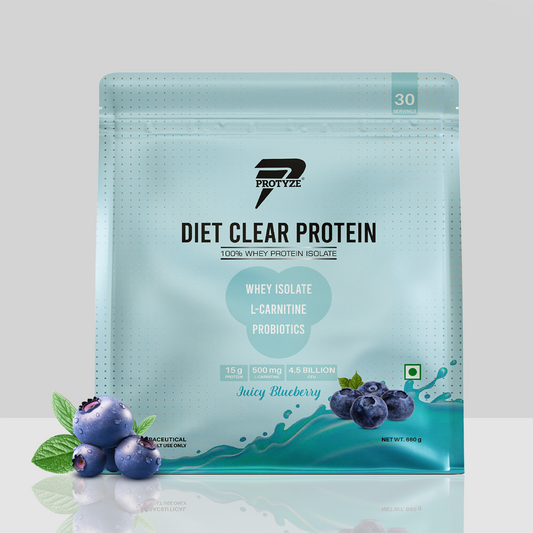Overeating is something almost everyone experiences at some point — whether it’s stress, social events, late-night cravings, or just not listening to your body’s hunger signals. While occasional indulgence is perfectly normal, frequent overeating can lead to weight gain, low energy, digestive issues, and long-term health concerns.
The good news? You don’t have to fight this struggle blindly. By understanding why it happens, making small but smart changes, and using practical strategies, you can regain control over your eating habits. Simple steps like eating mindfully, prioritizing protein, staying hydrated, and managing stress can make a big difference.
In addition, functional protein supplements, like Protyze Diet Clear Whey Protein, can be a helpful ally. With high-quality protein, probiotics, and L-Carnitine, they help you feel fuller for longer, support gut health, and keep your energy steady — making it easier to resist unnecessary snacking.
In this blog, we’ll share 7 proven steps to control overeating, along with bonus tips and insights on how functional protein can support your journey toward healthier, balanced eating habits.
1. Understand Why You Overeat
Before you can control overeating, it’s important to identify the root cause. Overeating is not always about hunger; it can be triggered by emotions, habits, or environment. Common reasons include:
- Emotional triggers: Stress, anxiety, or boredom often lead to “comfort eating.”
- Social and environmental cues: Large portions, buffet setups, or peer pressure can cause you to eat more than needed.
- Skipping meals or irregular eating: When your body is deprived, it can lead to excessive hunger later.
- Lack of protein or nutrient balance: Low-protein meals can leave you unsatisfied, increasing cravings.
By understanding why you overeat, you can create a targeted approach to prevent it.
2. Prioritize Protein in Every Meal
Protein is a key nutrient for appetite control. It helps you feel full for longer, stabilizes blood sugar, and reduces cravings.
- Protein-rich foods: Eggs, lean meats, legumes, and dairy are excellent options.
- Functional protein supplements: If you struggle to meet daily protein requirements, a high-quality protein drink can help. For example, Protyze Diet Clear Whey Protein provides 15g of fast-absorbing protein, plus probiotics and L-Carnitine. This combination not only supports lean muscle but also promotes satiety and gut health, making it easier to control portions.
Including protein in every meal, whether from whole foods or supplements, helps reduce the likelihood of overeating later in the day.
3. Eat Mindfully
Mindful eating is a practice where you pay full attention to your food — how it looks, smells, tastes, and makes you feel. This approach can significantly reduce overeating by helping you recognize when you’re actually full.
Practical tips for mindful eating:
- Eat slowly and chew thoroughly.
- Avoid distractions like TV or mobile phones while eating.
- Pause midway through your meal to assess hunger levels.
- Focus on the sensory experience of eating rather than rushing through it.
By being present during meals, you naturally become more aware of satiety cues and are less likely to overconsume.
4. Control Your Food Environment
The environment you eat in can influence your portion sizes and snacking habits. Small changes can make a big difference.
- Plan meals ahead: Preparing meals in advance helps avoid last-minute overeating.
- Use smaller plates and bowls: This tricks your brain into feeling satisfied with less food.
- Keep unhealthy snacks out of sight: Store them in opaque containers or out of reach.
- Stock healthy snacks: Nuts, fruits, and vegetables are more filling and nutrient-dense.
A supportive food environment reduces the temptation to overeat and helps you make healthier choices consistently.
5. Stay Hydrated
Sometimes, the body confuses thirst with hunger. Drinking water regularly can prevent unnecessary snacking and help regulate appetite.
- Start meals with water: A glass of water before eating can make you feel fuller.
- Include hydrating foods: Fruits and vegetables with high water content, such as cucumber, watermelon, and oranges, help keep you hydrated.
- Functional hydration: Drinks like Protyze Hydra Clear Whey Protein provide hydration, protein and electrolytes in one, making it perfect for post-workout or as a snack replacement to prevent overeating due to dehydration or fatigue.
Staying hydrated throughout the day is a simple but effective step in controlling appetite.
6. Manage Stress and Sleep
Stress and lack of sleep are major contributors to overeating. When you’re stressed, your body produces cortisol, which can increase appetite and cravings, particularly for sugary and high-fat foods. Poor sleep disrupts hunger hormones, making it harder to feel full.
Practical tips to manage stress and sleep:
- Practice deep breathing, meditation, or yoga.
- Engage in regular physical activity to release tension and boost mood.
- Maintain a consistent sleep schedule and aim for 7–9 hours per night.
- Avoid late-night snacking by preparing a healthy bedtime routine.
Reducing stress and improving sleep helps balance hunger hormones and lowers the urge to overeat.
7. Track and Reflect on Your Eating Habits
Keeping a food journal or using a tracking app can help you identify patterns in your overeating triggers.
- Note your meals and snacks: Write down what, when, and why you eat.
- Track emotions: Highlight situations when you ate out of stress, boredom, or celebration.
- Reflect weekly: Identify trends and areas for improvement.
Awareness is a powerful tool. Once you understand your habits, you can implement strategies like portion control, protein supplementation, or mindful eating to prevent overeating.
Bonus Tips for Long-Term Control
- Include fiber: High-fiber foods like vegetables, fruits, and whole grains help you stay full longer.
- Don’t skip meals: Skipping breakfast or lunch can lead to overeating in the evening.
- Smart snacking: Pair protein with fiber-rich snacks, such as an apple with peanut butter or a protein shake with berries.
- Stay active: Even light daily movement like walking or stretching can reduce stress and regulate appetite.
How Functional Protein Supports Overeating Control
While food and lifestyle changes are crucial, functional protein supplements can be a helpful ally. Protyze Diet Clear Whey Protein, for instance, combines high-quality whey protein, probiotics, and L-Carnitine, which together:
- Promote satiety and reduce the urge to snack unnecessarily.
- Support lean muscle maintenance, even during calorie-controlled diets.
- Improve gut health, which plays a role in appetite regulation.
- Provide a quick, convenient, and low-calorie source of protein, ideal for busy lifestyles.
Incorporating a functional protein like this once or twice a day can complement your dietary strategies and make overeating easier to manage.
Final Thoughts
Overeating is not a sign of weakness — it’s often a combination of physiological, psychological, and environmental factors. By understanding the triggers, prioritizing protein, practicing mindful eating, and supporting your body with functional nutrition, you can regain control over your meals.
Key takeaways:
- Identify why you overeat — stress, emotions, or poor meal planning.
- Include protein-rich foods and consider functional protein supplements.
- Eat mindfully and avoid distractions.
- Control your food environment with portion size and healthy snacks.
- Stay hydrated throughout the day.
- Manage stress and ensure adequate sleep.
- Track and reflect on your eating habits to identify patterns.
Small, consistent steps can lead to big improvements in your relationship with food. By combining healthy habits with smart protein supplementation like Protyze Diet Clear Whey Protein, you can enjoy meals, stay satisfied, and maintain better control over your health and fitness goals.





